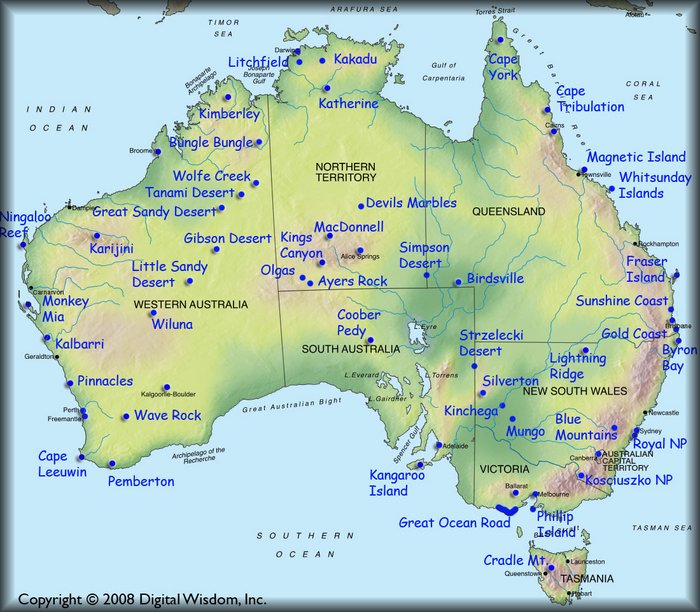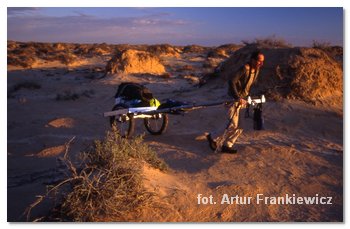 The currency is Australian Dollar (AUD), the rate from 2018 - 1 AUD = 0.70 USD. There is not one and two cent coin, they round the price to five cents. Credit cards and travelers checks are widely accepted, even in smaller towns you will find ATM’s.
The currency is Australian Dollar (AUD), the rate from 2018 - 1 AUD = 0.70 USD. There is not one and two cent coin, they round the price to five cents. Credit cards and travelers checks are widely accepted, even in smaller towns you will find ATM’s.
Choosing a mobile network company I was suggested by variety of promotions, and the most interesting had Optus, Telstra and Vodafone. Electrical plugs are unusual, but there are no problems with the adapter purchase, voltage 220V.
An interesting way to see the country is to travel by car. It can be purchased in many second hand car dealers on Parramatta Road, or look at the notice board in cheap hostels where travellers want to sell a car after their trip. The most popular are station wagons or campervans which are usually equipted with bed. This might be a low cost if we plan a longer trip and have some people to share the cost of fuel. Try as well gumtree. 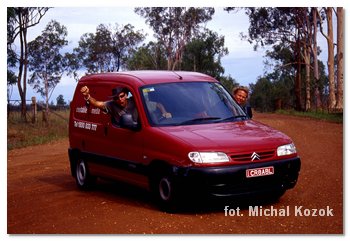 When purchasing check not only the motor but till when the registration is valid (Rego). Don’t buy a car which we have to worry about renew a registration during the journey, let's do it before or after the trip. In my case harmless-looking rust on the roof turned out to be quite a problem, it took me many weeks to solve this problem. It would be much cheaper to buy a car in winter, and sell it in the summer. Prices are rising especially from October to February.
When purchasing check not only the motor but till when the registration is valid (Rego). Don’t buy a car which we have to worry about renew a registration during the journey, let's do it before or after the trip. In my case harmless-looking rust on the roof turned out to be quite a problem, it took me many weeks to solve this problem. It would be much cheaper to buy a car in winter, and sell it in the summer. Prices are rising especially from October to February.
If we do not have too much time we might want to rent a car, what we can do in one of the many companies which are located on William St. However it's cheaper do it online, price depend as well from the location (exp. airport is more expensive, suburbs are cheaper). When hiring, we must have a credit card and international driving license. Prices in the company such as Hertz, Avis, Budget etc. for small personal car start from 40 AUD per day including all fees. It's worth to take full insurance, it might save you a lot of money.
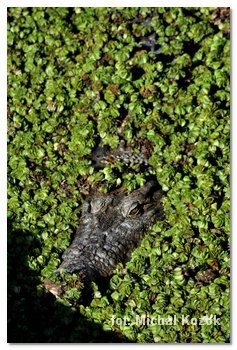 For campervan price starts from 75 AUD per day (full insurance is an additional cost of 15-25 AUD per day). See companies like Jucy, Auto-Barn, Wicked etc. There usually are unlimited kilometers, but there are extra fees for droping off the car in different location they pick up.
For campervan price starts from 75 AUD per day (full insurance is an additional cost of 15-25 AUD per day). See companies like Jucy, Auto-Barn, Wicked etc. There usually are unlimited kilometers, but there are extra fees for droping off the car in different location they pick up.
Going to less touristy places, especially in the outback, you can rent 4WD from about 100 AUD per day. It is surprising that according to car rental policy it can’t be driven on unpaved roads! So far, I rode those vehicles on gravel roads and after the trip I just washed the car well.
It is worth asking for relocation because some companies searching the drivers to bring a car from one city to another. Usually we get a time and mileage limit, but they refund us petrol costs, so the ride is almost for free! But I met people who got a car for example between Cairns and Sydney, and they saw almost nothing on the way because they had to go all the time, stopping only for the night.
 Unfortunately cars won’t go empty, they need a fuel. In 2015 one litre of unleaded cost about 1.40 AUD. This means that for example the route Sydney - Melbourne - Adelaide - Darwin will cost you about 660 AUD (4670km, consuming 10 litres/100 km, driving 8 hours a day for 6 days, not included the extra time nor distance to see nearby attractions, such as Ayers Rock). A good website where we can calculate the distance between towns, the cost of fuel, consumption, driving time, etc. can be found here. It means that if you want to see something along the way (Great Ocean Road, Ayers Rock and Kakadu), you have to rent a car for at least 12 days, what with fuel and full insurance will be not less than 2000 AUD.
Unfortunately cars won’t go empty, they need a fuel. In 2015 one litre of unleaded cost about 1.40 AUD. This means that for example the route Sydney - Melbourne - Adelaide - Darwin will cost you about 660 AUD (4670km, consuming 10 litres/100 km, driving 8 hours a day for 6 days, not included the extra time nor distance to see nearby attractions, such as Ayers Rock). A good website where we can calculate the distance between towns, the cost of fuel, consumption, driving time, etc. can be found here. It means that if you want to see something along the way (Great Ocean Road, Ayers Rock and Kakadu), you have to rent a car for at least 12 days, what with fuel and full insurance will be not less than 2000 AUD.
We must also remember that in the smaller towns petrol stations are usually closed at 7 pm. In the outback you should refill your tank at every station.
.jpg) Spend the night in the wild near the road can’t be done anywhere, but I camped almost anywhere where was no camping prohibition and I didn’t have any problems. Cheap hostels (for Australia) are available from 20 AUD/ person. The most useful is paper or digital map guide Camp Australia Wild - it's a must if you would like to use free campings. The hot shower can be used at the petrol stations for 2 AUD. Remember that with the distance from the ocean the nights are becoming cooler. It can be freezing even in the summer, as the temperature often drops below 0˚C.
Spend the night in the wild near the road can’t be done anywhere, but I camped almost anywhere where was no camping prohibition and I didn’t have any problems. Cheap hostels (for Australia) are available from 20 AUD/ person. The most useful is paper or digital map guide Camp Australia Wild - it's a must if you would like to use free campings. The hot shower can be used at the petrol stations for 2 AUD. Remember that with the distance from the ocean the nights are becoming cooler. It can be freezing even in the summer, as the temperature often drops below 0˚C.
It could be useful to have a second driver, especially at night when driving requires enormous concentration. Staying next to the road kangaroos often get blind by the car headlights and may suddenly jump under the wheels. This is very common especially at dusk or dawn, in this case, better hit the animal than turn the wheel rapidly and end up in the ditch or in the tree. 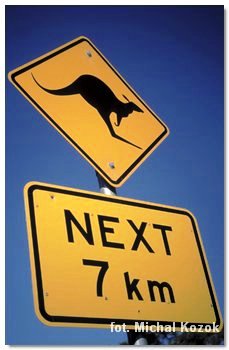
Another way to travel around the country is by bus. There are many passes with different options and the price depends on route, distance and validity of the ticket. The most popular is hop-on hop-off, so you can get in or out anytime you wish (exp. Sydney - Cairns for 330 AUD), or kilometer ticket in any destination (exp. 5,000 km for 800 AUD). More details on websites of the most popular coaches Greyhound or Premier Motor.
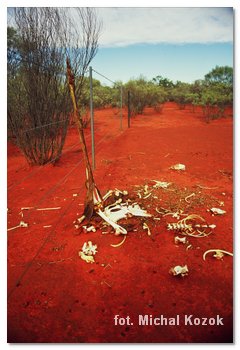 Trains are not the cheapest option, but it is a kind of different experience. For example, a seat from Adelaide to Darwin cost over 300 AUD.
Trains are not the cheapest option, but it is a kind of different experience. For example, a seat from Adelaide to Darwin cost over 300 AUD.
You can use cheap flights which allow us to save a lot of time. On domestic routes there are four major airlines: QANTAS, VIRGIN BLUE, JETSTAR and TIGER. Except the promotional prices the companies normaly offer economy class Darwin - Sydney from 200 AUD one way, included all taxes.
The cheapest and a very interesting way to travel around the continent is a hitchhiking, which in my opinion is fantastic here. You don't have to walk - where you drop off you continue, as usually there is only one road. From time to time you catch some long distance runner and go, let say 1,000 km. Of course drivers talk about backpackers' murders and missing in the recent years in Australian outback, but the risk is like everywhere, not higher than in Europe. However, drivers in Australia are extremely helpful. Often making some detour for you, almost always leave you at the edge of the town which should be your best spot. Also a number of nights I spent in pubs, later at their houses, and learned a lot of things that cannot be read in the guidebook. Often happen that the drivers on the longer distances were asking me for a change behind the wheel. Have your driving license on you.
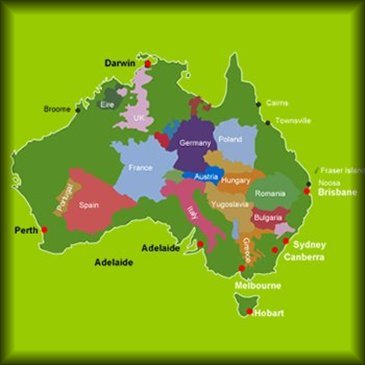 The route Darwin - Sydney I hitchhiked twice, the first time took me 8 days with visiting the main attractions, and second time 5 days without major stopping.
However Sydney - Mackay took me twice 3 days each leg. My sister and her friend, and another time Ewelina with her friend, were hitchhiking around Australia during one month with intensive sightseeing. From Sydney via Ayers Rock, Darwin, Broom, Perth and return to Sydney (as you can see two women did it safely). Remember that distances are small only on the map. Comparison of Europe to Australia is best illustrated by map on the right.
The route Darwin - Sydney I hitchhiked twice, the first time took me 8 days with visiting the main attractions, and second time 5 days without major stopping.
However Sydney - Mackay took me twice 3 days each leg. My sister and her friend, and another time Ewelina with her friend, were hitchhiking around Australia during one month with intensive sightseeing. From Sydney via Ayers Rock, Darwin, Broom, Perth and return to Sydney (as you can see two women did it safely). Remember that distances are small only on the map. Comparison of Europe to Australia is best illustrated by map on the right.
I don't agree with the opinion that the Australian outback is boring and monotonous. For me just passing the empty, straight, endless road, with a red hot soil around is something unusual. The vast space calms me down, let me taste soil's smell. No way to be bored, the views are unique - especially with composition together with Australian sky and clouds. Crossing some of the state boundaries, we have to remember that is not allowed to carry fresh fruit, meat or vegetables.
Buying trip from tourist agency is cheaper than online. Especially if you buy a package we can count on a big discount. 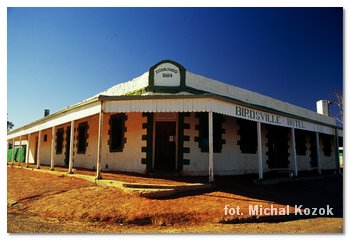 The best way is to check price in first agency, then go to another one asking if they can beat the price. While working in a travel agency in Sydney, part of trips described I managed do for free. They often were returns to the places that I’ve visited before by car or hitchhiking. Personally, I'm not a fan of organized tourism, and I provide prices to people who have less time to explore Australia.
The best way is to check price in first agency, then go to another one asking if they can beat the price. While working in a travel agency in Sydney, part of trips described I managed do for free. They often were returns to the places that I’ve visited before by car or hitchhiking. Personally, I'm not a fan of organized tourism, and I provide prices to people who have less time to explore Australia.
Accommodation in Australia is no problem. There is highly developed network of expensive hotels, as well as cheap backpackers. Prices in the dormitories are usually between 20 and 25 AUD per bed, but it depends primarily on the quality, season and location. We can look in the Lonely Planet or in the many similar websites such as hostelworld
